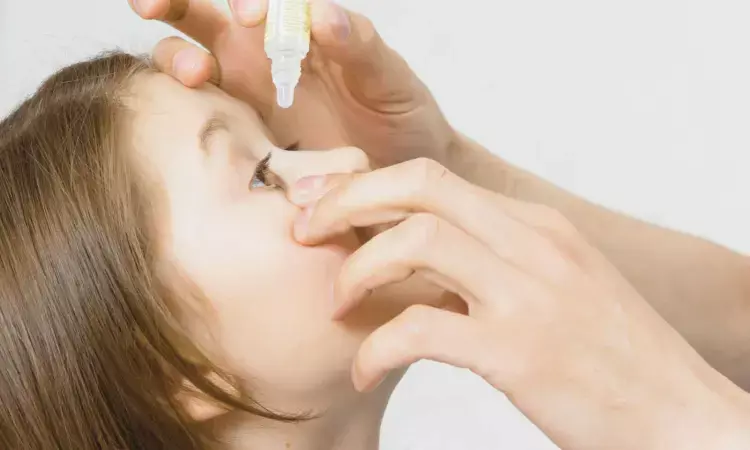- Home
- Medical news & Guidelines
- Anesthesiology
- Cardiology and CTVS
- Critical Care
- Dentistry
- Dermatology
- Diabetes and Endocrinology
- ENT
- Gastroenterology
- Medicine
- Nephrology
- Neurology
- Obstretics-Gynaecology
- Oncology
- Ophthalmology
- Orthopaedics
- Pediatrics-Neonatology
- Psychiatry
- Pulmonology
- Radiology
- Surgery
- Urology
- Laboratory Medicine
- Diet
- Nursing
- Paramedical
- Physiotherapy
- Health news
- Fact Check
- Bone Health Fact Check
- Brain Health Fact Check
- Cancer Related Fact Check
- Child Care Fact Check
- Dental and oral health fact check
- Diabetes and metabolic health fact check
- Diet and Nutrition Fact Check
- Eye and ENT Care Fact Check
- Fitness fact check
- Gut health fact check
- Heart health fact check
- Kidney health fact check
- Medical education fact check
- Men's health fact check
- Respiratory fact check
- Skin and hair care fact check
- Vaccine and Immunization fact check
- Women's health fact check
- AYUSH
- State News
- Andaman and Nicobar Islands
- Andhra Pradesh
- Arunachal Pradesh
- Assam
- Bihar
- Chandigarh
- Chattisgarh
- Dadra and Nagar Haveli
- Daman and Diu
- Delhi
- Goa
- Gujarat
- Haryana
- Himachal Pradesh
- Jammu & Kashmir
- Jharkhand
- Karnataka
- Kerala
- Ladakh
- Lakshadweep
- Madhya Pradesh
- Maharashtra
- Manipur
- Meghalaya
- Mizoram
- Nagaland
- Odisha
- Puducherry
- Punjab
- Rajasthan
- Sikkim
- Tamil Nadu
- Telangana
- Tripura
- Uttar Pradesh
- Uttrakhand
- West Bengal
- Medical Education
- Industry
Atropine 0.01 Percent Eye Drops Effective in Maintaining Choroidal Thickness in Myopia Treatment: MOSAIC Trial

Ireland: A recent study conducted as part of the Myopia Outcome Study of Atropine in Children (MOSAIC) clinical trial explored the long-term effects of 0.01% atropine eye drops on macular choroidal thickness (ChT) in children with myopia.
The study, published in Acta Ophthalmologica, found that children with myopia treated with 0.01% atropine eye drops experienced stable choroidal thickness over two years, while the placebo group showed continuous thinning in the subfoveal, parafoveal, and perifoveal regions. Notably, atropine's impact on ChT appeared to be largely independent of changes in axial length or refraction, indicating that atropine may directly influence the choroid. This discovery could provide valuable new insights into the management of myopia.
Given the global rise in myopia cases, understanding how to manage both the progression of myopia and its structural consequences is crucial in preventing future vision-related complications. Considering this, James Loughman, Centre for Eye Research Ireland, Environmental Sustainability and Health Institute, Technological University Dublin, Dublin, Ireland, and colleagues aimed to examine the two-year changes in macular choroidal thickness in children treated with 0.01% atropine eye drops and explore its association with progression in spherical equivalent refraction (SER) and axial length (AL) elongation.
For this purpose, the researchers enrolled 250 myopic children aged 6–16 years (167 receiving 0.01% atropine and 83 receiving a placebo) in the MOSAIC clinical trial. Only participants with complete 2-year data on macular choroidal thickness (measured using Topcon Triton Swept-Source OCT), spherical equivalent refraction, and axial length were included in the analysis. The researchers analyzed changes in macular ChT over two years and examined the associations between these changes and the progression of SER and AL elongation using linear mixed models.
The following were the key findings of the study:
- The analysis included a total of 187 children (126 treated with 0.01% atropine and 61 with a placebo).
- Over 2 years, choroidal thickness remained stable in the 0.01% atropine group, while the placebo group showed consistent thinning in the subfoveal, parafoveal, and perifoveal macular subfields.
- In the subfoveal area, the mean change in choroidal thickness was 0.49 ± 2.22 μm for the atropine group and −9.46 ± 2.69 μm for the placebo group.
- In the parafoveal area, the mean change was 1.40 ± 1.73 μm for the atropine group and −8.11 ± 2.08 μm for the placebo group.
- In the perifoveal area, the mean change was 0.80 ± 1.25 μm for the atropine group and −6.17 ± 1.69 μm for the placebo group.
- Choroidal thickening was observed in participants with slower axial eye growth and myopia progression, regardless of the treatment group.
- Mediation analysis revealed that 68.3% of the effect of atropine 0.01% on ChT was direct, while 31.7% was mediated through axial length changes.
- For SER, 80% of the effect on ChT was direct, with 20% mediated by SER changes.
The findings showed that children with myopia treated with 0.01% atropine eye drops had stable choroidal thickness over two years, while the placebo group experienced consistent thinning.
"The effects of atropine on the choroid were not fully explained by changes in axial length or refraction, suggesting that atropine directly influences ChT. Since ChT is linked to conditions like myopic maculopathy, these results indicate that atropine 0.01% may help slow axial eye growth and myopia progression, potentially reducing the risk of developing myopic maculopathy in the future," the authors wrote.
Reference:
Kobia-Acquah, E., Lingham, G., Flitcroft, D. I., & Loughman, J. Two-year changes of macular choroidal thickness in response to 0.01% atropine eye drops: Results from the myopia outcome study of atropine in children (MOSAIC) clinical trial. Acta Ophthalmologica. https://doi.org/10.1111/aos.17429
Dr Kamal Kant Kohli-MBBS, DTCD- a chest specialist with more than 30 years of practice and a flair for writing clinical articles, Dr Kamal Kant Kohli joined Medical Dialogues as a Chief Editor of Medical News. Besides writing articles, as an editor, he proofreads and verifies all the medical content published on Medical Dialogues including those coming from journals, studies,medical conferences,guidelines etc. Email: drkohli@medicaldialogues.in. Contact no. 011-43720751


